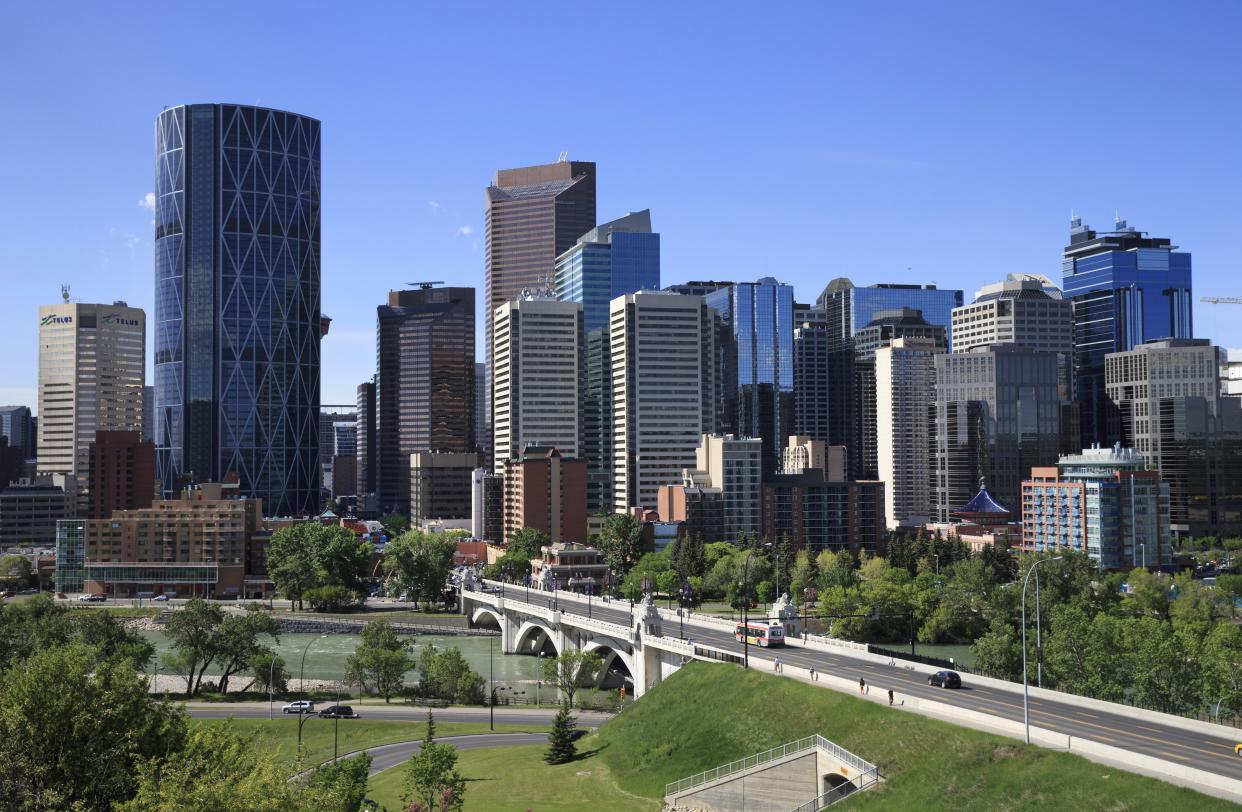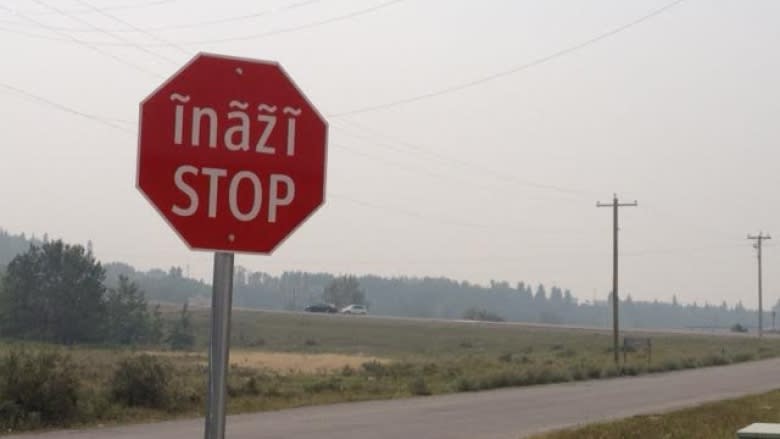Expect more Indigenous requests to rename places, advocate says

Alberta regulations mean an Indigenous group cannot ask to rename Calgary and Canmore, provincial officials say, but an Indigenous advocate says these kinds of requests are part of “hard conversations” connected to reconciliation that Canada must have.
Earlier in November, the Stoney Nakoda nation sent a letter to the provincial government, asking to rename the cities and geographic features like the Bow River and Mount Allan, along with more than 100 other sites. Their letter stated the change would respect their heritage, and said the current English and Cree names of the area do not.
“The Stoney Nakoda people are the original occupants of the land and place names should be changed to their traditional Stoney Nakoda names in order to allow the culture and history of these lands to become more known and respected,” the letter reads, according to CBC News.
“This lack of recognition contributes to an increasing threat that Stoney Nakoda heritage will be overrun.”
Not a straightforward process
The regulations are clear: third parties cannot request to change the names of municipalities, the Alberta Ministry of Indigenous Relations told Yahoo Canada News.
“Any request to change the name of a provincial municipality, such as Calgary or Canmore, must come from the municipality itself,” says Kyle Ferguson, Press Secretary for the Office of the Minister at the Alberta Ministry of Indigenous Relations. “The municipality would send in the request to Municipal Affairs, which would then take it forward on behalf of the municipality.”
The Alberta Ministry of Culture and Tourism told Yahoo Canada News its Geographic Names Program received the Stoney Nakoda nation’s letter. The ministry says its mandate only involves the names of physical and geographical features such as lakes, rivers, and mountains.
Unlike cities, the ministry says anyone can submit a request proposing an official name for a geographic site. The ministry says once it receives the proposal, research on the feature and area are conducted. The province then holds outreach sessions with Indigenous communities and municipalities in the area and solicits comments from the public. Once that is over, the proposal and evaluation results go to the board of the Alberta Historical Resources Foundation, which makes a recommendation to accept or reject the proposal. The Minister of Culture and Tourism has the final decision.
“Truth-telling” and reconciliation
Applying an Indigenous name to a geographic feature wouldn’t set a precedent in Canada. According to Natural Resources Canada, Manitoba approved Indigenous names for 117 places in 2016 – one of which was Weenipagamiksaguygun for Lake Winnipeg. It’s the traditional Anishinaabe name the Poplar River First Nation uses for the body of water, but it has retained the name of Lake Winnipeg.
The renaming of a city to reflect Indigenous heritage would also not be a Canadian first. Iqaluit was known as Frobisher Bay until 1987 when its name was changed. The new name means “place of (many) fish” in Inuktitut.
Ruth Koleszar-Green, a professor of Indigenous Research with York University’s School of Social Work, says renaming cities and geographic places in Canada is a key element of reconciliation because it disrupts the idea that Canada was “built” by two nations. She says she thinks we will see more of these kinds of requests in the future.
“There are many nations that have lived here since time immemorial,” she says. “Since we’ve been calling spaces as we’ve been taught, it just makes sense to return to the words as we start to truth-tell. That’s the part that I think gets lost. We are seen as a space of reconciliation. But the fact is that the land has been taken, and in many ways.”
Koleszar-Green says treaties signed by Indigenous peoples and the Crown “never gave up the right to name space.”
“When we forget the land, or we sanitize the land that we’re on, we’re not telling the truth about the land,” she says. “So how truthful is it to call different spaces colonial terms?”
In light of the damage done to Indigenous peoples through residential schools, the 2015 Truth and Reconciliation Commission Report made 94 calls to action to the federal and provincial governments.
These included specific recommendations on language and culture, including that the federal government “acknowledge that Aboriginal rights include Aboriginal language rights.” The report also urged the federal government to create an Aboriginal Languages Act recognizing Indigenous languages are “a fundamental element of Canadian culture and society, and there is an urgency to preserve them.” It said such legislation should acknowledge “the preservation, revitalization, and strengthening of Aboriginal languages and cultures are best managed by Aboriginal people and communities.”
But Koleszar-Green says Indigenous children were told they couldn’t speak their own languages long before residential schools. She says renaming places to acknowledge Indigenous heritage would help revitalize Indigenous languages in the country and help Indigenous peoples reconnect with who they are because it helps “build fluency.”
“Language, and knowing where you are, are foundational to that,” she says. “I also believe it’s part of responsibility. I wouldn’t go into another community or another space and say, ‘Well, I can’t say that word, so I’m going to call it this.’”

There are more than 70 Indigenous languages spoken across Canada, according to 2016 census data. Several of those are now “endangered,” the federal agency says.
But at the same time, Statistics Canada says 2016 census data indicates Indigenous peoples are attempting to revitalize their languages.
The number of Indigenous people who could speak an Indigenous language had increased by 3.1 per cent since 2006, the latest census data indicates. But that outnumbers those who have an Indigenous language as their mother tongue.
Nevertheless, Statistics Canada says this suggests “many people, especially young people, are learning Aboriginal languages as second languages.”
There are 3,665 Stoney language speakers in Canada, according to the 2016 census, nearly all of whom are in Alberta. Earlier in 2017, the nation launched a free mobile app containing over 500 words. Elders told the Rocky Mountain Outlook they created the app so young people could learn the language and to prevent its decline.
Settling disputes
The Stoney Nakoda are not the only nation who say Calgary is located on their territory. They are part of Treaty 7, which also includes the Tsuu T’ina Nation and the Blackfoot Confederacy nations of the Kainai, Piikani, and Siksika.
Piikani Nation Chief Stanley Grier sent a letter to Calgary Mayor Naheed Nenshi and Ron Kelland, who co-ordinates the Alberta Geographical Names Program, disputing the Stoney Nakoda’s request.
“The cultural, historic, and archeological record of the territory does not support this conjuncture, and, in fact, contradicts it,” Grier wrote, according to CBC News.
Grier says the Stoney Nakoda actually arrived in the area near Calgary after 1550, and the lands where the city is located have been within the Blackfoot Confederacy “since time immemorial.”
Koleszar-Green says issues like this can be solved with community consultations with Indigenous peoples and discussions between Indigenous groups.
“Indigenous people have been pitted against each other for resources, for recognition, for a lot of things,” she says, and also says very few treaties apply to only one Indigenous group.
“If we’re going to be in truth telling and we’re going to be in these spaces, hard conversations are going to happen… You have to be able to move through the hard stuff to get to the other conversations, the reconciliation.”


